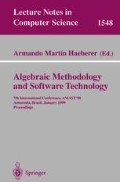Abstract
Our work intends to verify reactive systems with event memorization specified with the reactive language Electre. For this, we define a particular behavioral model for Electre programs, Reactive Fiffo Automata (RFAs), which is close to Fifo Automata. Intuitively, a RFA is the model of a reactive system which may store event occurrences that must not be immediately taken into account. We show that, contrarily to lossy systems where the reachability set is recognizable but not effectively computable, (1) the reachability set of a RFA is recognizable, and (2) it is effectively computable. Moreover, we also study the relationships between RFAs and Finite Automata and we prove that (3) from a trace language point of view, inclusions between RFAs and Finite Automata are undecidable and (4) the linear temporal logic LTL on states without the temporal operator next is decidable for RFAs, while LTL on transitions is undecidable.
Access this chapter
Tax calculation will be finalised at checkout
Purchases are for personal use only
Preview
Unable to display preview. Download preview PDF.
References
P. A. Abdulla, A. Bouajjani, and B. Jonsson. On-the-fly analysis of systems with unbounded, lossy fifo channels. In Proc. of the 10th Conference on Computer-Aided Verification (CAV), 1998.
P. Adulla and B. Jonsson. Verifying programs with unreliable channels. In Proc. of the 8 th IEEE Symposium on Logic in Computer Science, 1993.
F. Boniol, A. Burgueño, O. Roux, and V. Rusu. Étude d’un modéle hybride discret-continu pour la spécification de systémes temps-réel embarqués. Rapport de contrat CERT/ONERA-IRCyN N0 DERI 3703-33, February 1998.
B. Boigelot and P. Godefroid. Symbolic verification of communication protocols with infinite state spaces using qdds. In Proc. of the 8th Conference on Computer-Aided Verification (CAV), volume 1102, pages 1–12. LNCS, August 1996.
B. Boigelot, P. Godefroid, B. Willems, and P. Wolper. The power of qdds. In Proceedings of SAS’97, September 1997.
A. Bouajjani and P. Habermehl. Symbolic reachability analysis of FIFOchannel systems with nonregular sets of configurations. In Proc. of the 24th International Colloquium on Automata, Languages, and Programming (ICALP), volume 1256, pages 560–570. LNCS, July 1997.
D. Brand and P. Zafiropulo. On communicating finite-state machines. JACM, 30(2):323–342, 1983.
G. Cécé and A. Finkel. Programs with quasi-stable channels are effectively recognizable. In Proc. of the 9th Conference on Computer-Aided Verification (CAV), volume 1254, pages 304–315. LNCS, June 1997.
G. Cécé, A. Finkel, and I. S. Purushothaman. Unreliable channels are easier to verify than perfect channels. Information and Computation, 124(1):20–31, 1996.
P. J. Courtois, F. Heymans, and D. L. Parnas. Concurrent control with “readers” and “writers”. Communications of the ACM, 14(10):667–668, October 1971.
F. Cassez and O. Roux. Compilation of the Electre reactive language into finite transition systems. Theoretical Computer Science, 146(1-2):109–143, July 1995.
F. Cassez and O. Roux. Modelling and verifying reactive systems with event memorisation. Revised version submitted, 1997.
E. A. Emerson. Handbook of Theoretical Computer Science, chapter 16, pages 996–1072. Elsevier Science Publishers, 1990.
A. Finkel and A. Choquet. Simulation of linear fifo nets by petri nets having a structured set of terminal markings. In Proc. of the 8th European Workshop on Application and Theory of Petri Nets, Saragoza, pages 95–112, 1987.
A. Finkel and P. McKenzie. Verifying identical communicating processes is undecidable. Theoretical Computer Science, 174:217–230, 1997.
T. Jéron and C. Jard. Testing for unboundedness of fifo channels. Theoretical Computer Science, 113:93–117, 1993.
L. Lamport. What good is temporal logic? In Information Processing’83. Proc. IFIP 9th World Computer Congress, pages 657–668. North-Holland, September 1983.
Z. Manna and A. Pnueli. The Temporal Logic of Reactive and Concurrent Systems: Specification. Springer-Verlag, 1992.
J. K. Pachl. Protocol description and analysis based on a state transition model with channel expressions. In Proc. of Protocol Specification, Testing and Verification, VII, 1987.
Y. M. Quemener. Vérification de protocoles á espace d’états infini représentable par une grammaire de graphes. PhD thesis, Université de Rennes 1 (FRANCE), 1996.
A. P. Sistla and E. M. Clarke. The complexity of propositional linear temporal logics. Journal of the ACM, 32(3):733–749, 1985.
G. Sutre. Vérification de propriétés sur les automates á file réactifs produits par compilation de programmes Electre. Mémoire de DEA, Univ. Paris VII et Ecole Polytechnique, 1997.
Author information
Authors and Affiliations
Editor information
Editors and Affiliations
Rights and permissions
Copyright information
© 1998 Springer-Verlag Berlin Heidelberg
About this paper
Cite this paper
Sutre, G., Finkel, A., Roux, O., Cassez, F. (1998). Effective Recognizability and Model Checking of Reactive Fiffo Automata. In: Haeberer, A.M. (eds) Algebraic Methodology and Software Technology. AMAST 1999. Lecture Notes in Computer Science, vol 1548. Springer, Berlin, Heidelberg. https://doi.org/10.1007/3-540-49253-4_10
Download citation
DOI: https://doi.org/10.1007/3-540-49253-4_10
Published:
Publisher Name: Springer, Berlin, Heidelberg
Print ISBN: 978-3-540-65462-9
Online ISBN: 978-3-540-49253-5
eBook Packages: Springer Book Archive

